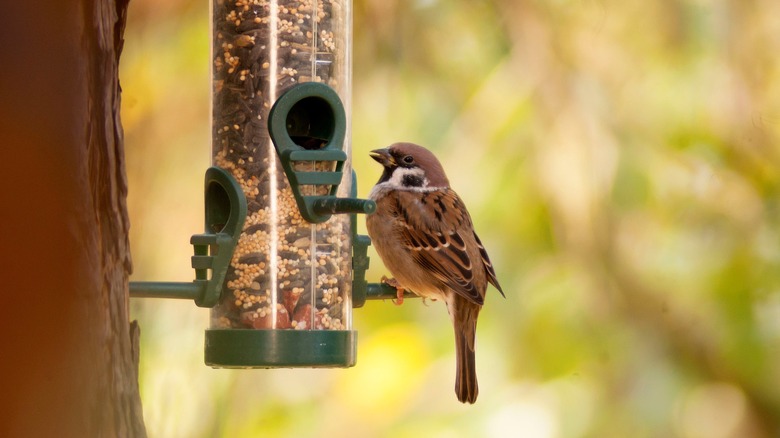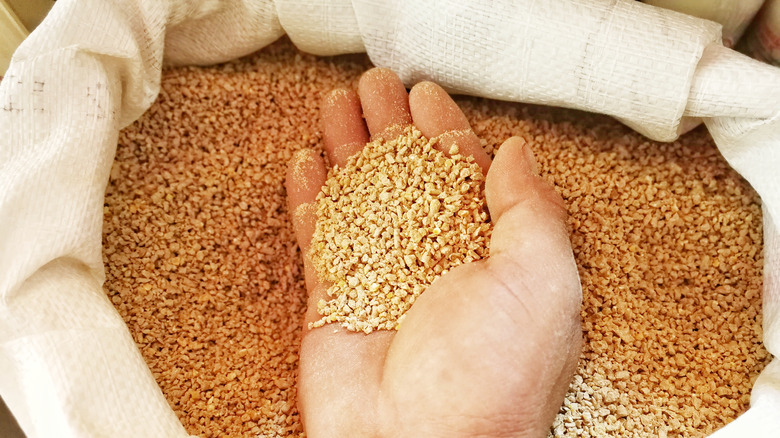Feed The Birds For Less With This Amazing Birdseed Substitute
We may receive a commission on purchases made from links.
There's nothing better than watching birds swoop down into your yard throughout the day to peck at your bird feeder. Whether you're an avid bird watcher with your own set of professional binoculars or just love to see the different species while you sip your coffee in the morning, it's a wonderful hobby that brings life and color to your backyard. However, if you're a birdwatcher on a budget, you're probably looking for cheaper substitutes for birdseed. Filling your feeder can get quite expensive — especially if you occasionally have unwanted pests in your birdfeeder eating some of the supply. To keep costs down, you can swap your regular seed concoction for chicken feed. It has a lot of similar ingredients, and most birds will flock to it similarly.
However, there are some caveats to this hack. If you're looking for savings, you need to buy the chicken feed from particular retailers, or else it might end up costing the same as bird seed. And if you want to provide your neighborhood feathered friends with the most nutritious, energy-packed feed possible, you might need to amend the feed with some extra ingredients. That's because nutritious mixes often have a blend of different ingredients, such as fruits and suet, many of which don't end up in chicken feed. Here's a deep dive into the switch.
Why you can use chicken feed in place of birdseed
Everyone from bird observatory professionals to amateur homesteaders to birdwatchers endorse this money-saving hack, so it's worth a try. Most chicken feeds include grains and seeds like millet, milo, sunflower seeds, wheat, and cracked corn. Coincidently, many of these same ingredients are also found in birdseed mixes. For example, black oil sunflower seeds and white proso millet are often added to birdfeeds because they attract the broadest range of birds. These birds love black oil sunflower seeds because they have thin, easy-to-crack-open shells and very high oil content. They contain 40% oil, which means they contain plenty of energy-giving fat. On the other hand, a wide variety of birds also like white proso millet because it's high in protein, minerals, and carbs, delivering a lot of nutrients in one snack.
However, it's important to note that wheat, cracked corn, and milo are often considered "filler" in bird mixes, and birds often bypass them to eat the nutritious seeds instead. These aren't bad ingredients, exactly. They just don't attract as many birds, aren't as nutrient-dense as seeds, and some can spoil rather quickly (like the cracked corn.) Because of this, you might find yourself tossing the filler out into the trash before refilling your feeder with your next batch. In the end, you're paying for ingredients your birds won't be interested in. So keep that in mind when choosing a substitute chicken feed, ensuring it doesn't have too many filler ingredients.
Caveats to keep in mind
In order to make this swap cost-effective, you have to buy your chicken feed in a certain spot. For example, if you buy chicken feed from a massive retailer like Amazon, it most likely will cost the same as birdseed. To illustrate, two pounds of organic chicken feed on Amazon costs $19, and two pounds of birdseed costs $20. It, of course, also depends on what brand you buy and what types of seeds and grains the mix has, but the prices are pretty comparable.
Instead, you need to get your chicken feed from a feed store to see savings. For example, on average, a 50-pound bag clocks in around $20. However, you will likely have to amend it with some extra ingredients to ensure it is nutritious enough and provides enough energy to your feathered friends. For example, the Gulf Coast Bird Observatory mixes its feeders with a 1:1 ratio of chicken scratch and black oil sunflower seed. Without the amendments, you might be attracting birds and feeding them but not providing them with the real sustenance they need.


